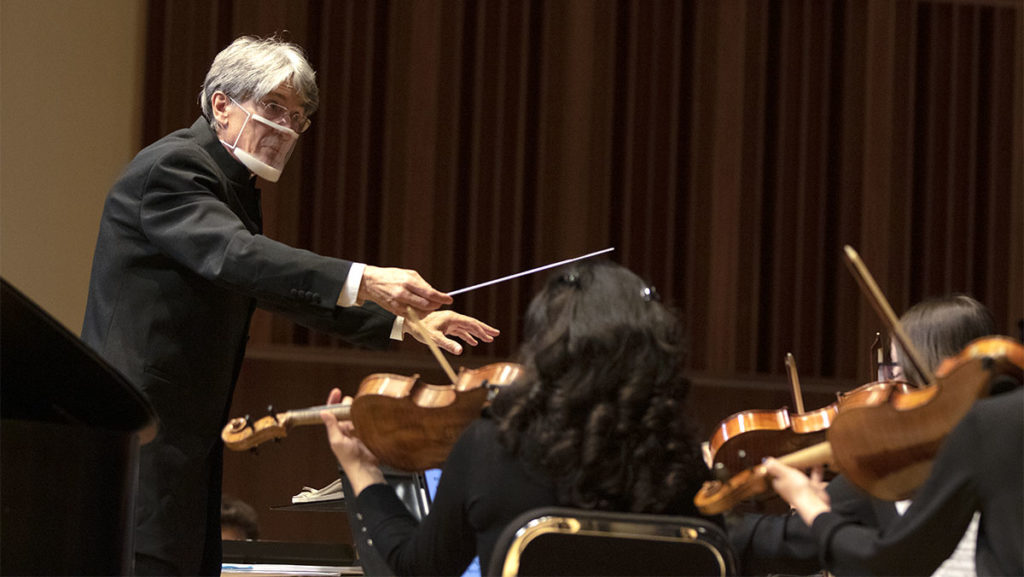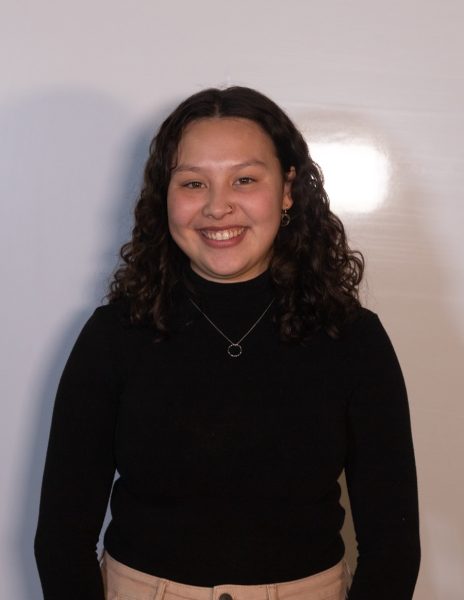A crowd of approximately 200 people filled the seats of Hockett Family Recital Hall on Sept. 18 to watch senior Madison Carrol’s, “A Very GLEE Recital.” As the first note of “Don’t Rain on My Parade” was sung, the crowd fell silent, listening intently to the live performance.
Carrol performed one of the first in-person recitals this semester after many Ithaca College COVID-19 protocols were lifted. Last semester, students had the option to perform their recitals virtually or in person with a limited audience. No one outside of the college was allowed to attend and audience members had to select their seats ahead of time. All performances in Hockett and Ford Hall were live streamed for attendees who could not view recitals in person. This semester, there are no audience restrictions.
Carroll said being able to perform her recital in person was an amazing feeling.
“As soon as it ended, I wanted to do it all again,” Carroll said. “I love singing and making music with people I like in front of other people because it’s just fun, and the more fun you have on stage, the more fun people have in the audience. And then the more fun people have in the audience, the more fun you have on stage because you’re like, ‘People are really enjoying themselves. This is awesome.’”
Sophomore Sadie Hofford said she saw Carrol’s recital and was excited to be seeing it in person.
“You can just feel so much more of the performer’s emotions and connections when you’re in the same room as them,” Hofford said. “I think that’s a huge difference that I didn’t even realize, but I’ve just been really moved the past couple performances I’ve watched, and it has to be because of it being in person because I listen to a lot of music, and that doesn’t happen unless I’m seeing it live.”
Stephen Carroll, Madison Carroll’s father, said Madison Carroll had to put a lot of effort into coordinating the performance and was happy to see the final result.
“As much as it was an awesome performance there was a lot I know that went into setting that up,” he said. “But it was a pretty amazing experience. The whole room was electric. So, I’m very glad I went.”
This semester there are no longer any distancing requirements for performers, whereas last semester instrumentalists had to be 6–12 feet apart, and singers had to be 12–20 feet apart. Time limitations have also been lifted. Last semester musicians could only perform for 30 minutes in a space before allowing the room to air out as mandated by the School of Music’s COVID-19 protocol. Grant Cooper, interim director of instrumental ensembles, said these changes have allowed musicians to perform in a more normal capacity.
“I feel it’s been a remarkable change between last semester that we got rid of the airing out the room and the social distancing,” Cooper said. “And that means that we’re rehearsing and performing in ways that are much closer — they’re not identical, but are much closer — to the normal model.”
This semester, masks and personal protection equipment like bell covers for instruments, are still mandated. Hofford said she worries about the lifting of COVID-19 restrictions, but is glad that wearing masks is still enforced.
“It’s definitely a little scary, just going back full force,” Hofford said. “I don’t really know what a middle level would be in that situation, but it definitely feels like we went from 100% precautionary to pretty much 0% precautions besides wearing masks — which I trust the masks a lot, and that is good. I don’t think I would feel comfortable if we didn’t have masks on.”
Carrol said she thinks the transition back to completely in-person learning and performances has been difficult for some musicians.
“A lot of the people I know had a really hard time devoting the same energy they had here to their practice at home because of the pandemic,” Carroll said. “Especially at the beginning, it was like there’s this deadly disease. There’s literally nothing else for me to even have space for my brain except, like, ‘Is the world ending?’ So a lot of people fell out of touch with that, and then getting back into it in this sense, in person, I think has been challenging for a lot of people.”
Fifth year Adrianna Anzalone will perform her senior recital Oct. 10 in Hockett. Anzalone said she did a virtual performance for her junior recital last year, so she is experiencing the preparation for an in-person recital for the first time.
“Usually you have your junior recital, that goes a little ‘Eh’, [but] you can show out at your senior [recital],” Anzalone said. “But I haven’t had that opportunity, so this whole process has been very new for me, and very … scary.”
Senior Christopher Louis Bavaro will perform his senior recital Oct. 19 in Hockett. Bavaro said he was completely remote last year and is excited to perform his senior recital in person.
“Being able to be in a gorgeous hall like Hockett, where the acoustics are just phenomenal, that really is what just makes this whole thing so exciting,” Bavaro said. “Being able to see how much my voice has grown in the past four years and being able to fill that hall with songs that I enjoy and having a live audience — that’s just something that you can’t really recreate when you are behind a screen.”
Typically all students in the School of Music are required to attend 12 performances each semester. They must confirm attendance through a swipe system where they swipe their IDs in before the concert and swipe out after the concert. Students must attend three guest or faculty recitals, three ensemble performances, three student recitals and three more performances of the student’s choice. Junior Laura Van Voris said this requirement was lifted temporarily last year, so students did not have to attend any recitals. She said this caused a change in recital attendance.
“I think the biggest difference from last year’s recitals is that … there wasn’t a required recital attendance, and so no one really came to them,” Van Voris said. “So now that people can come to recitals, they’re going to because they need the swipes.”
Cooper said he is looking forward to a safe transition so everyone can experience the power of live performance again.
“There’s something really, really special about being a human being that we can communicate with each other and enjoy each other’s talents and the ways that the arts allow us to do that,” Cooper said. “So I’m all for a very measured response to come back, and also, hopefully we remember what it was like when it was taken away and maybe learn to value it even more highly.”









